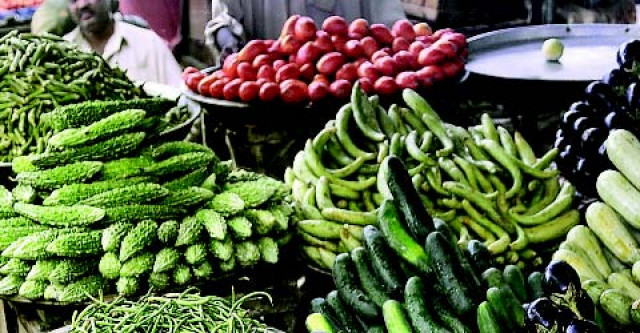Everything is allowed, sir!
I was standing next to the fruit vendor’s stall, when the traffic policeman came and asked him to shift his cart.

“You see, he is just doing this to get his share,” the vendor smirked. I asked him if he charges more from the customers because he has to pay bribe.
The vendor just flashed a mysterious smile and told me, “Sab chalta hai, sahib! [everything is allowed, sir]”
While we were busy in our little game of principles, a young girl in a black outfit picked an apple from the car and ran away. The vendor chased her but she quickly darted out of sight.
The devastating floods have not only ruined Ramazan for the affected people but those in safe locations are also finding it hard to survive the month. The prices of most food items have multiplied in the past few days, making an essential item on the iftar table - the fruit chat - a luxury few can afford.
The prices of fruits, vegetables and pulses have increased because their crops were washed away in the flood and the remaining stock is being transported to the cities at high fares.
Afifa Khatoon came to buy some fruits to make fruit chat for the second roza but found the prices exorbitant. “They [shopkeepers] are all together in exploiting buyers because they know very well that no matter what, people will buy fruits this month,” she said, shaking her head.
One day before Ramazan started, apples were available for Rs50 to Rs60 per kg and on the first roza, they were sold for up to Rs90 to Rs100 per kilogramme. Muhammad Hussain managed to buy some apples and bananas but was unhappy with the price hike. “What has gone wrong over night?” he questioned the vendor.
Muhammad Saeed, the vendor, went on to blame the middlemen, from whom they buy fruit. “We buy small quantities from the middlemen, who buy in bulk from the wholesalers,” he said, adding that the middlemen are to blame for the price increase.
Apples were not the only fruit to suffer as the price of bananas went up by Rs20 a dozen. Sundarkhani grapes went up from Rs120 per kg to Rs160. Even though dates are considered essential during Ramazan, they have become unaffordable for many at the rate of Rs350 per kg.
Meat sellers have also upped their prices. Beef has increased from Rs140 per kg to Rs230 while boneless beef is up from Rs170 per kg to Rs 290. Similarly, mutton was being sold for Rs240 per kg and is now available at Rs380 per kg. White meat, on the other hand, is being sold at Rs220 per kg for the past four months.
Prices of pulses and grams have increased by around 50 per cent. Sugar, sold at utility stores, is available for Rs55 per kg but in the market it is being sold at prices between Rs65 and Rs72 per kg.
The price of milk depends on the quantity of water mixed in it. Rates start from Rs36 per litre and can go up to Rs60 per litre, while yogurt is also sold at prices between Rs45 and Rs70 per kg.
The district government issues a rate list for commodities of daily use but the assigned prices are never followed. Shopkeepers defend themselves by saying that they cannot sell an item for Rs45 per kg if they have bought it for Rs50. “It is impossible for me to sell fruits according to the list provided by the district administration,” said Abdul Sattar, a fruit vendor. The wholesalers have increased prices and have, thus, forced retailers to follow suit, he added.
Published in The Express Tribune, August 14th, 2010.



















COMMENTS
Comments are moderated and generally will be posted if they are on-topic and not abusive.
For more information, please see our Comments FAQ